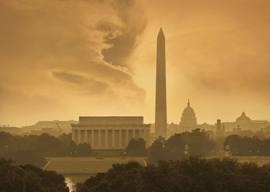
September 05, 2014

Source: Shutterstock
American bombs have returned to Iraq. A year after the Obama Administration’s proposed air strikes in Syria were thwarted by public outcry, the military-industrial complex is back at work. This time, the target has been switched. Instead of dethroning a sitting dictator, missiles will be targeting Islamic militants. To think, it only took a year for American power to become bogged down in the Middle East yet again.
With another bombing crusade in Iraq commencing, neoconservatives in the media are back in the spotlight. After the folly of Syria, talk of warmongering along the Potomac died down. That is, until the nascent rise of the Islamic State spilled over into Iraq. When the terrorist group started creating havoc in the northern part of the country, the same folks who wished for bombs in Damascus now had a new hobgoblin. It didn”t take long for the usual neocon suspects”Charles Krauthammer, Jennifer Rubin, John Bolton, Rich Lowry“to issue slogans about the existential threat posed by a new band of Islamic terrorists.
Weekly Standard founder Bill Kristol jumped with joy at the prospect of air strikes. As the largest proponent of an affable, happy-go-lucky foreign policy of endless human slaughter, Kristol has never encountered a death crusade he didn”t like”at least, not one conducted by Western governments. Speaking to radio host Laura Ingraham, the portly saber-rattler asked: “What’s the harm of bombing [ISIS] at least for a few weeks and seeing what happens?”
How’s that for wise and prudent foreign policy? Why not simply murder a few terrorists for the fun of it? What could go wrong?
As a putative conservative, Kristol’s bomb-first-ask-questions-later approach is anathema to both measured restraint and basic decency. It doesn”t even make sense. If human life matters to the point where an evil entity like the Islamic State needs to be purged from the earth, then “let’s see what happens” is the most reckless and asinine policy prescription possible. Kristol’s attitude is that of a child: touching a hot stove to see if it will burn.
There’s nothing at all conservative about this approach to the oft-tangled affair known as foreign policy. It doesn”t recognize the folly of man. That’s why it’s rightly classified as “neoconservatism.” Kristol’s impromptu call to arms is both cynical and hateful”and not in a sardonic way. It comes from someone who oftentimes occupies the token conservative seat on Sunday morning political shows. Kristol’s remarks are seen as the counterpoint to bleeding-heart liberalism when, as intellectual history shows, they are one and the same.
As a neoconservative, Kristol embodies the spirit of revolutionary zeal. He demands perpetual war in the hope that sooner or later, foreign lands will surrender to Uncle Sam’s hegemony. The neoconservative philosophy is based on the idea that constant democratic upheaval will bring the world under one rule. This line of thinking can be traced back to his father”Irving Kristol, the well-acknowledged “godfather of neoconservatism””and even further back to communist agitator Leon Trotsky.
When put in the context of Marxist dialectics, the neoconservative ideology quickly becomes a plucky mix of visionary revolution and bloodlust. Irving Kristol himself was once a member of the “Workers” Party””a Trotsky-influenced political group. In his Neoconservatism: The Autobiography of an Idea, Kristol admits to being “lucky to have been a young Trotskyite and I have not a single bitter memory.”
The original neoconservative was far from alone in his reverence for the man who died under Stalin’s ice pick. As neocon Seymour Martin Lipset once wrote, “the anti-Stalinists who became conservatives”including James Burnham, Whittaker Chambers, and Irving Kristol”the Right gained a political education and, in some cases, an injection of passion.” This passion includes, in that great Wilsonian phrase, “making the world safe for democracy.” Much like Trotsky’s quest to launch a socialist revolution in every corner of the planet, neocons today fight the same war. The only difference is that they crusade for liberal democracy”which in some ways is more debased and vile than outright communism.
Trotsky was, as The Nation‘s Ian Williams suggests, “a man of action” who “fomented revolution” with romantic ideals. This relishing of regime overthrow explains why Bill Kristol and his neocon compatriots salivate over meddling in the Middle East. A geographic area artificially divided by European powers at the turn of the 20th century, the Fertile Crescent is a smoldering pot that occasionally bursts its top. Ethnic conflicts, religious crusades, the struggle for ownership of natural resources”all these and more create a foundation of instability. Harnessing that indignation to oust unruly dictators is the neocon itinerary.
The past five years have seen numerous conflicts in the Middle East, nearly all encouraged and abetted by neoconservatives. In Egypt, President Mubarak was deposed, only to be replaced with the Muslim Brotherhood candidate Mohamed Morsi. Two years later, the military performed a coup and imprisoned Morsi, shooting dead some hundred pro-Morsi demonstrators. Each time, neocons gave vocal support to both sides.